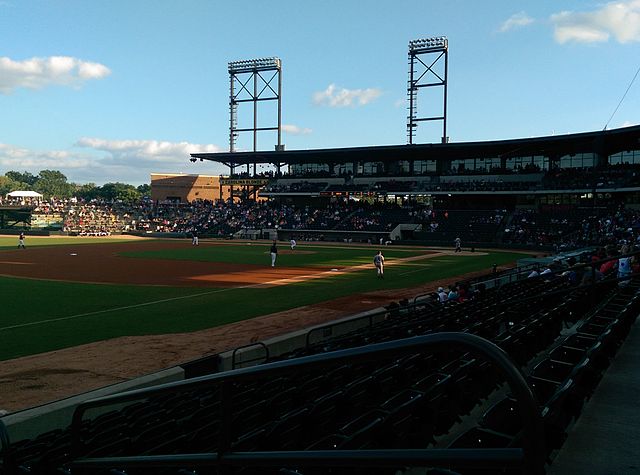On Sunday, August 14, the Winston-Salem Dash fell to the Bowling Green Hot Rods by a 4-2 score at their home grounds, Truist Stadium. Angela and I were in attendance along with my cousin Caskie, who made the trip down from her home in Danville, VA. We bumped into some other friends at the ballpark as well, and it was a beautiful day for watching a game, despite the disappointing result.
Ange and I spent Saturday night in a downtown hotel and got to do a decent amount of walking around the city. We went to dinner in the Arts District, which is a lively area with a lot of eating and drinking spots, in the vicinity of the old R.J. Reynolds headquarters. We walked through Old Salem and the big Moravian Cemetery.
We found a historic marker on the line between the two formerly separate towns, Winston and Salem. I vaguely knew that there had been a merger, but hadn't considered the details. Salem was settled first: the Christian pietist community. Winston came later, the industrial boomtown. The official incorporation happened in 1913, but the contiguous towns had been referred to jointly for a generation prior.
Winston-Salem has been in the minor leagues almost every year since 1908. Until World War II the team was nicknamed the Twins, in recognition of the city's dualistic background. Winston-Salem was in the Carolina League continuously from 1945 to 2019. The club was a Boston Red Sox farm team for over 20 years. Their best-known alumnus is probably Wade Boggs. They've been a Chicago White Sox affiliate since 1997, which might not be a coincidence (Winston-Salem / White Sox?) In the recent minor league reorganization, Winston-Salem was shifted the South Atlantic League.
The team was known as the Warthogs for a time, in the cutesy era of the 1990s and 2000s. They became the Dash in 2008. Apparently it is a reference to the punctuation mark between Winston and Salem.
Opened in 2010, Truist Stadium is an attractive park, located downtown which is a plus with me. Truist, incidentally, is a bank which has undergone a merger and rebranding, hence their putting their new name on everything possible. Winston-Salem has a Truist Stadium as well as a Truist Field, where Wake Forest University plays.
Ballpark foods enjoyed were a burger and a hot dog, to which my companions gave less than rave reviews, so I got a bratwurst, which was decent. Beers enjoyed: a Foothills Brewery Session IPA, out of Winston-Salem, and a Wicked Weed Pernicious IPA, an Asheville product.
The Piedmont Triad, I really believe, is an area more fertile than average as a baseball seedbed. Why? The mill league culture plays a part, I think. Area schools, notably Guilford College and Oak Ridge Academy, had good baseball programs in the early 20th century.
- Ernie Shore (1891-1980) attended Guilford College. He became one of the pitching mainstays, along with Babe Ruth, on the Boston Red Sox teams that won the World Series in 1915 and 1916. After retiring from baseball, he served as sheriff of Forsyth County (which includes Winston-Salem) for 34 years. For over five decades Ernie Shore Field was the home of the Winston-Salem entry in the Carolina League.
- Sam Gibson (1899-1983), hailing from the town of King, won 32 games in the majors, but over 300 in the minors. He won 200 games just for the San Francisco Seals, where he played with two DiMaggio brothers.
- Alvin Crowder (1899-1972), nicknamed General, went 167-115 as a big-league pitcher, which is especially impressive since he was 27 years old when he made his debut. He pitched in three World Series and got a complete game victory in Game 4 of the 1935 WS, for the eventual champion Detroit Tigers. Later he was an owner, manager, and executive of the Winston-Salem Twins.
- Kernersville native Kemp Wicker (1906-1973) won 202 games in pro ball, 10 of them in the major leagues. He had a lot of good seasons in the high minors, and had, well, more than one cup of coffee in the majors. He made a relief appearance with the Yankees in the 1937 World Series. He was a minor-league manager, then returned home to N.C. late in life to raise tobacco and cattle.
- Laymon Yokely (1906-1975) was a Black player in the Jim Crow era, and a fine pitcher at his peak. He was the staff ace of the Baltimore Black Sox club who won the American Negro League pennant in 1929. The information I found on his life was a bit thin; he is buried in Winston-Salem.
- Johnny Temple (1927-1994), raised in Reeds Crossroads, was a second baseman and a terrific leadoff hitter for the Cincinnati Reds in the 1950s. Temple had his demons, which plagued him in his baseball career and afterwards, and which Bob Trostler and Bill James have written about. But he was a wonderful small-ball player. A six-time All-Star.
- Don Cardwell (1935-2008) pitched 14 seasons and over 2100 innings in the National League. He contributed as a spot starter on the Amazin' Mets of 1969. Tom Seaver credited him as being a good veteran mentor. After retiring as a player, Cardwell returned to Winston-Salem and worked in sales for the Ford Motor Company.

No comments:
Post a Comment